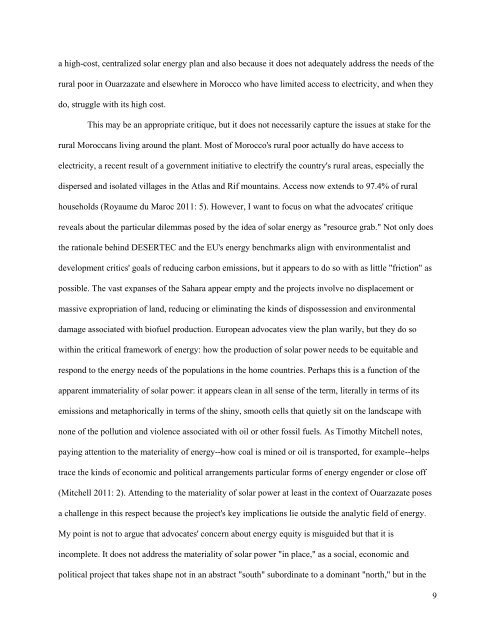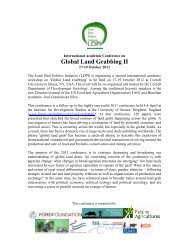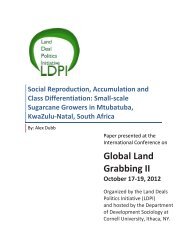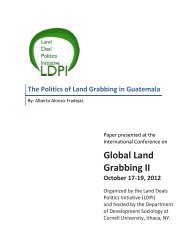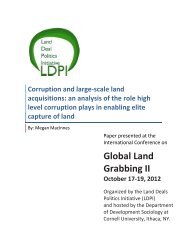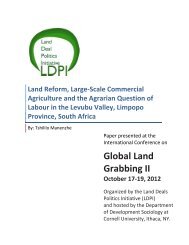Theorizing Sovereignty in Empty Land - Contested Global Landscapes
Theorizing Sovereignty in Empty Land - Contested Global Landscapes
Theorizing Sovereignty in Empty Land - Contested Global Landscapes
- No tags were found...
You also want an ePaper? Increase the reach of your titles
YUMPU automatically turns print PDFs into web optimized ePapers that Google loves.
a high-cost, centralized solar energy plan and also because it does not adequately address the needs of the<br />
rural poor <strong>in</strong> Ouarzazate and elsewhere <strong>in</strong> Morocco who have limited access to electricity, and when they<br />
do, struggle with its high cost.<br />
This may be an appropriate critique, but it does not necessarily capture the issues at stake for the<br />
rural Moroccans liv<strong>in</strong>g around the plant. Most of Morocco's rural poor actually do have access to<br />
electricity, a recent result of a government <strong>in</strong>itiative to electrify the country's rural areas, especially the<br />
dispersed and isolated villages <strong>in</strong> the Atlas and Rif mounta<strong>in</strong>s. Access now extends to 97.4% of rural<br />
households (Royaume du Maroc 2011: 5). However, I want to focus on what the advocates' critique<br />
reveals about the particular dilemmas posed by the idea of solar energy as "resource grab." Not only does<br />
the rationale beh<strong>in</strong>d DESERTEC and the EU's energy benchmarks align with environmentalist and<br />
development critics' goals of reduc<strong>in</strong>g carbon emissions, but it appears to do so with as little "friction" as<br />
possible. The vast expanses of the Sahara appear empty and the projects <strong>in</strong>volve no displacement or<br />
massive expropriation of land, reduc<strong>in</strong>g or elim<strong>in</strong>at<strong>in</strong>g the k<strong>in</strong>ds of dispossession and environmental<br />
damage associated with biofuel production. European advocates view the plan warily, but they do so<br />
with<strong>in</strong> the critical framework of energy: how the production of solar power needs to be equitable and<br />
respond to the energy needs of the populations <strong>in</strong> the home countries. Perhaps this is a function of the<br />
apparent immateriality of solar power: it appears clean <strong>in</strong> all sense of the term, literally <strong>in</strong> terms of its<br />
emissions and metaphorically <strong>in</strong> terms of the sh<strong>in</strong>y, smooth cells that quietly sit on the landscape with<br />
none of the pollution and violence associated with oil or other fossil fuels. As Timothy Mitchell notes,<br />
pay<strong>in</strong>g attention to the materiality of energy--how coal is m<strong>in</strong>ed or oil is transported, for example--helps<br />
trace the k<strong>in</strong>ds of economic and political arrangements particular forms of energy engender or close off<br />
(Mitchell 2011: 2). Attend<strong>in</strong>g to the materiality of solar power at least <strong>in</strong> the context of Ouarzazate poses<br />
a challenge <strong>in</strong> this respect because the project's key implications lie outside the analytic field of energy.<br />
My po<strong>in</strong>t is not to argue that advocates' concern about energy equity is misguided but that it is<br />
<strong>in</strong>complete. It does not address the materiality of solar power "<strong>in</strong> place," as a social, economic and<br />
political project that takes shape not <strong>in</strong> an abstract "south" subord<strong>in</strong>ate to a dom<strong>in</strong>ant "north," but <strong>in</strong> the<br />
9


